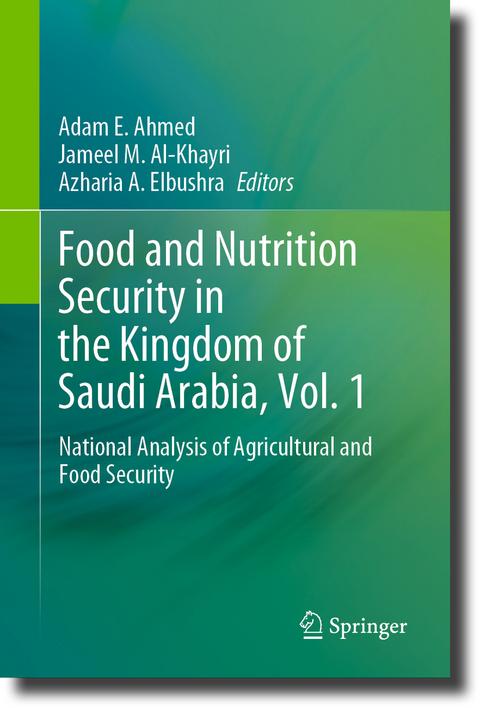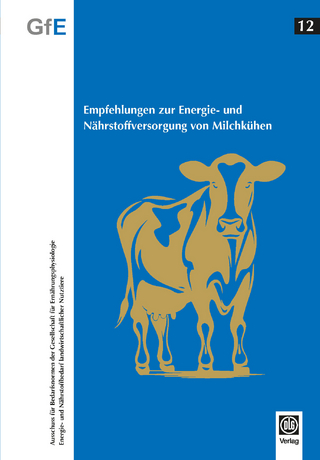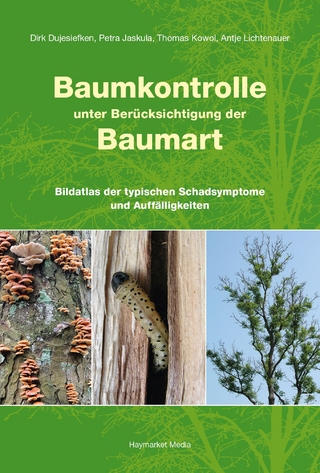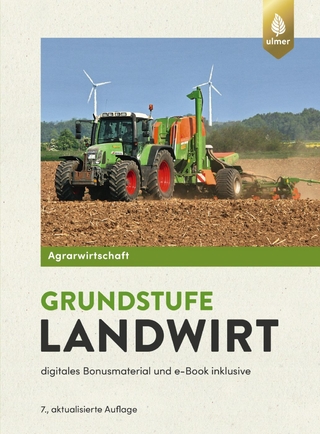
Food and Nutrition Security in the Kingdom of Saudi Arabia, Vol. 1
Springer International Publishing (Verlag)
978-3-031-46715-8 (ISBN)
The book consists of four volumes. Volume 1, entitled "National Analysis ofAgriculture and Food Security" aims to assess the current state of food security in Saudi Arabia, covering key aspects such as agriculture and food resources, food systems, crops, livestock, poultry, fisheries, animal health, food loss and waste, transportation and strategic reserve infrastructure, food security institutions, population, agricultural extension, climate change, agricultural mechanization, smart agriculture, and the utilization of solar energy.
This book is highly significant for professionals, researchers, policymakers, and entrepreneurs involved in food and nutrition security in Saudi Arabia, the Gulf Cooperation Council, and various national and international organizations. It offers a comprehensive analysis of the obstacles and possibilities in ensuring food and nutrition security, as well as presenting practical approaches to address these issues. Additionally, graduate students studying in fields related to food and nutrition security willbenefit from this book.
Dr. Adam E. Ahmed is an Associate Professor of Agricultural Economics in the Department of Agribusiness and Consumer Sciences, College of Agricultural and Food Sciences, King Faisal University. He obtained his B.Sc. in Agricultural Economics from the University of Khartoum, Sudan (1994); M.Sc. in Agricultural Economics from the same university (1997). He obtained his Ph.D. at the University of Giessen, Germany (2004). He joined the Department of Agricultural Economics, Faculty of Agriculture, University of Khartoum (1994) as a Teaching Assistant (1994-98); Lecturer (1999-2000); Assistant Professor (2004-2009), and Associate Professor 2010 to present. Dr. Ahmed has pursued a variety of works including teaching, research, and community outreach. In these contexts, he has published two books, 6 chapters, more than 30 articles in peer-reviewed journals, and 20 conference papers. He is the founder of Albilad Bank Chair for Food Security in Saudi Arabia, as well as the Food Loss and Waste Research Chair. He is the initiator of King Faisal's initiative" Stop Food Loss and Waste" and the Initiative to strengthen Saudi Arabia's Rank in the Global Food Security Index. He had several consultancy assignments with FAO, WFP, ACSAD, and USAID. Dr. Ahmed participated in research projects funded by King Abdulaziz City of Science and Technology (KACST) in Saudi Arabia. He was the PI of the national research project "Assessment of the patterns and determinants of breastfeeding and complementary feeding in infants in KSA".
Prof. Jameel M. Al-Khayri is affiliated with the Department of Agricultural Biotechnology, King Faisal University, Saudi Arabia. He received B.S. in Biology in 1984 from the University of Toledo, M.S. in Agronomy in 1988, and Ph.D. in Plant Science in 1991 from the University of Arkansas. He is a member of the International Society for Horticultural Science and serves as the National Correspondent of the International Association of Plant Tissue Culture and Biotechnology. He has authored 106 research articles, 58 chapters and edited several journal special issues. In addition, he edited 25 reference books on plant biotechnology, genetic resources, breeding, genomics and nanotechnology. He has been involved in organizing international scientific conferences and contributed numerous research presentations. In addition to teaching, advising and research, he held administrative responsibilities as the Assistant Director of Date Palm Research Center, Head of Department of Plant Biotechnology and Vice Dean for Development and Quality Assurance. Prof. Al-Khayri served as a Member of Majlis Ash-Shura (Saudi Legislative Council) for the 2009-2012 term. He is interested in the role of biotechnology in enhancing food security and mitigation of the impact of climate change on agriculture.
Dr. Azharia A. Elbushra is an Associate Professor of Agricultural Economics at the Department of Agribusiness and Consumer Sciences, King Faisal University, Saudi Arabia. She obtained her Ph.D. in Agricultural Economics from the University of Khartoum in 2007. She started her career as a teaching assistant in the Department of Agricultural Sciences, College of Natural Resources and Environmental Sciences, University of Juba, Sudan in 1994, lecturer in 1998, Assistant Professor in 2007. In August 2011, she joined the Department of Agricultural Economics and Agribusiness at the College of Agriculture, University of Bahri, Sudan, and was promoted to Associate Professor in April 2013. Her expertise is in the field of agricultural policy, project
Food security policies and programs: synthesis and analysis.- Domestic food production and food security: status quo and potential.- Aggregate domestic food consumption: patterns of change and future predictions.- Livestock production and food security in KSA.- Water security: status quo and future prospects.- Population growth and its implications for food security.- Infrastructure, transport, and their effect on national food security.- Food security information: availability, consistency, reliability and accessibility.- Analysis of the KSA government programs that enhanced food security situation.- Role of domestic and nongovernmental institutions involved in food and nutrition security in KSA.- Food prices: trends and growth during the last three decades.- Food security early warning systems in KSA.- Food and agricultural product strategic reserve in KSA.- Role of agricultural extension in food and nutrition securityin KSA.- Higher education institution in KSA: Role, contribution and food security initiatives.- Climate change and food security situation in KSA.- Food supply chains in KSA.- Food sustainability in KSA under the current resource potential.- Role of smart Agriculture in Food Security.
| Erscheinungsdatum | 04.01.2024 |
|---|---|
| Zusatzinfo | XV, 472 p. 112 illus., 96 illus. in color. |
| Verlagsort | Cham |
| Sprache | englisch |
| Maße | 155 x 235 mm |
| Gewicht | 847 g |
| Themenwelt | Weitere Fachgebiete ► Land- / Forstwirtschaft / Fischerei |
| Schlagworte | food security • Food waste • global climate change • Nutrition • Water security |
| ISBN-10 | 3-031-46715-9 / 3031467159 |
| ISBN-13 | 978-3-031-46715-8 / 9783031467158 |
| Zustand | Neuware |
| Informationen gemäß Produktsicherheitsverordnung (GPSR) | |
| Haben Sie eine Frage zum Produkt? |
aus dem Bereich


